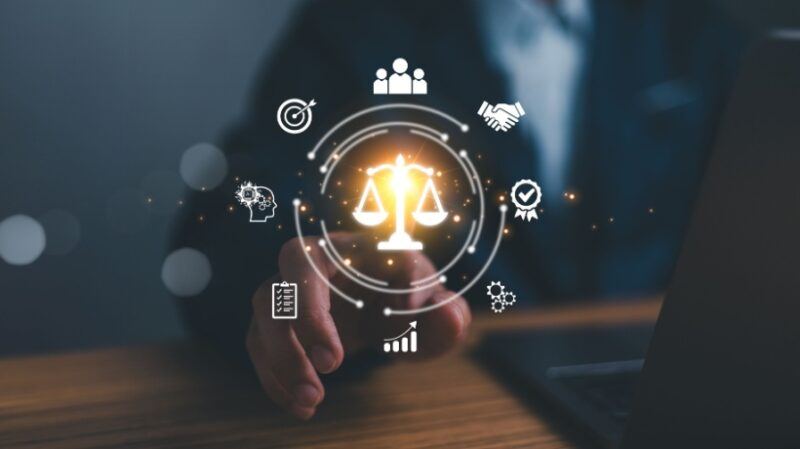eLearning Ethics: What To Know About Them

The Significance Of Upholding Ethics In eLearning
The fast progress of eLearning has reworked schooling, making content material accessible anytime and anyplace. This shift has revolutionized the way in which we be taught and educate, bridging geographical obstacles and empowering thousands and thousands with information at their fingertips. Nevertheless, as with all innovation, eLearning comes with its personal set of challenges—notably moral points. Addressing these issues is crucial to make sure a good, inclusive, and safe on-line studying setting. eLearning ethics play a significant function in respecting the rights and privateness of stakeholders whereas guiding the event and implementation of platforms and supplies to uphold justice and the integrity of the academic expertise.
Key Moral Points In eLearning
1. Knowledge Privateness And Safety
One of the crucial important moral issues in eLearning is the safety of learners’ information. With platforms gathering huge quantities of non-public data—akin to names, e-mail addresses, searching historical past, and studying patterns—it turns into crucial to safeguard this information in opposition to breaches and unauthorized use.
- Instance
Platforms accumulate consumer information to personalize studying experiences. Nevertheless, they need to implement strong cybersecurity measures to make sure that the info is saved securely and stays inaccessible to unauthorized events. - Why it issues
A breach in information privateness can undermine belief and deter learners from partaking in on-line schooling. Moreover, it may possibly have authorized ramifications for the platform concerned.
2. Mental Property Rights
Respecting the mental property after all creators is essential in sustaining moral requirements in eLearning. Many instructors make investments important time and sources in growing high-quality supplies, and unauthorized use or replication of their work is a violation of their rights.
- Instance
If an educator makes use of content material from one other writer with out permission or correct attribution, they’re infringing on mental property legal guidelines. - Resolution
Platforms ought to educate customers and instructors on copyright legal guidelines and encourage the usage of licensed or open-access supplies.
3. Tutorial Integrity
Tutorial dishonesty, akin to plagiarism and dishonest, is a major problem in eLearning. Guaranteeing the originality of learners’ work and the equity of assessments is essential to sustaining the credibility of on-line schooling.
- Instance
Instruments might help detect plagiarism and promote originality in assignments, fostering a tradition of educational integrity. - Greatest practices
Platforms ought to combine anti-cheating mechanisms, present clear tips on tutorial honesty, and use expertise to observe assessments.
4. Accessibility
Inclusive schooling is a cornerstone of moral eLearning. Platforms should make sure that all learners, together with these with disabilities, can entry content material with out obstacles. This entails designing supplies that cater to numerous wants, akin to closed captions, transcripts, and display reader compatibility.
- Instance
Varied platforms supply closed captions and downloadable transcripts, making their programs accessible to hearing-impaired learners. - Impression
Prioritizing accessibility not solely complies with authorized requirements but additionally expands the platform’s attain to numerous audiences.
5. Inclusivity And Equality
Fairness in schooling means offering equal studying alternatives to all, no matter socioeconomic backgrounds. eLearning platforms should actively work to bridge gaps brought on by monetary constraints or lack of entry to expertise.
- Instance
Some platforms present monetary support choices for learners who can not afford course charges, guaranteeing schooling is inside everybody’s attain. - Moral crucial
Addressing inequality in schooling can rework lives and empower underprivileged communities.
6. Trainer Accountability And Professionalism
Instructors play a pivotal function in shaping the eLearning expertise. They need to uphold professionalism by delivering constructive suggestions, being unbiased in evaluations, and fostering a supportive studying setting.
- Instance
On-line instructors ought to guarantee their instructing strategies are clear and accessible to all learners, avoiding any type of favoritism or discrimination. - Pointers
Coaching educators in moral instructing practices can improve the standard of on-line programs and construct belief amongst learners.
7. Confidentiality And Privateness
Defending the confidentiality of delicate pupil data, akin to grades and private information, is one other important facet of eLearning ethics. Platforms should implement insurance policies to stop information from being shared with out consent.
- Instance
Platforms ought to keep away from sharing consumer information with third events until explicitly approved. - End result
Sustaining confidentiality helps set up a safe and reliable studying setting.
Greatest Practices For Upholding eLearning Ethics
To create an moral eLearning ecosystem, platforms and educators should undertake the next finest practices:
- Transparency
Talk how information is collected, saved, and used. Guarantee learners are conscious of privateness insurance policies and their rights. - Copyright compliance
Use solely licensed, open-access, or public area supplies to respect mental property. - Design for accessibility
Create content material that accommodates numerous learners, together with these with disabilities. Use instruments like alt textual content, closed captions, and responsive design. - Promote tutorial integrity
Foster a tradition of honesty through the use of plagiarism detection instruments, designing assessments to scale back dishonest, and educating learners on moral practices. - Cultural consciousness
Guarantee course supplies are culturally delicate and inclusive, reflecting the variety of learners.
Conclusion
Ethics are on the coronary heart of eLearning, guaranteeing a safe, honest, and inclusive instructional setting. Because the digital studying area continues to develop, addressing moral issues akin to information privateness, mental property, accessibility, and tutorial integrity turns into much more important. By adhering to moral practices, platforms and educators can construct belief, foster innovation, and ship high-quality schooling that advantages learners worldwide. Via transparency, inclusivity, and respect for all stakeholders, eLearning can fulfill its potential as a transformative pressure in schooling.
By prioritizing ethics, we not solely improve the credibility of on-line schooling but additionally create a extra simply and equitable studying ecosystem. Allow us to make sure that as we advance technologically, we stay dedicated to ideas that uphold the dignity and rights of each learner.

